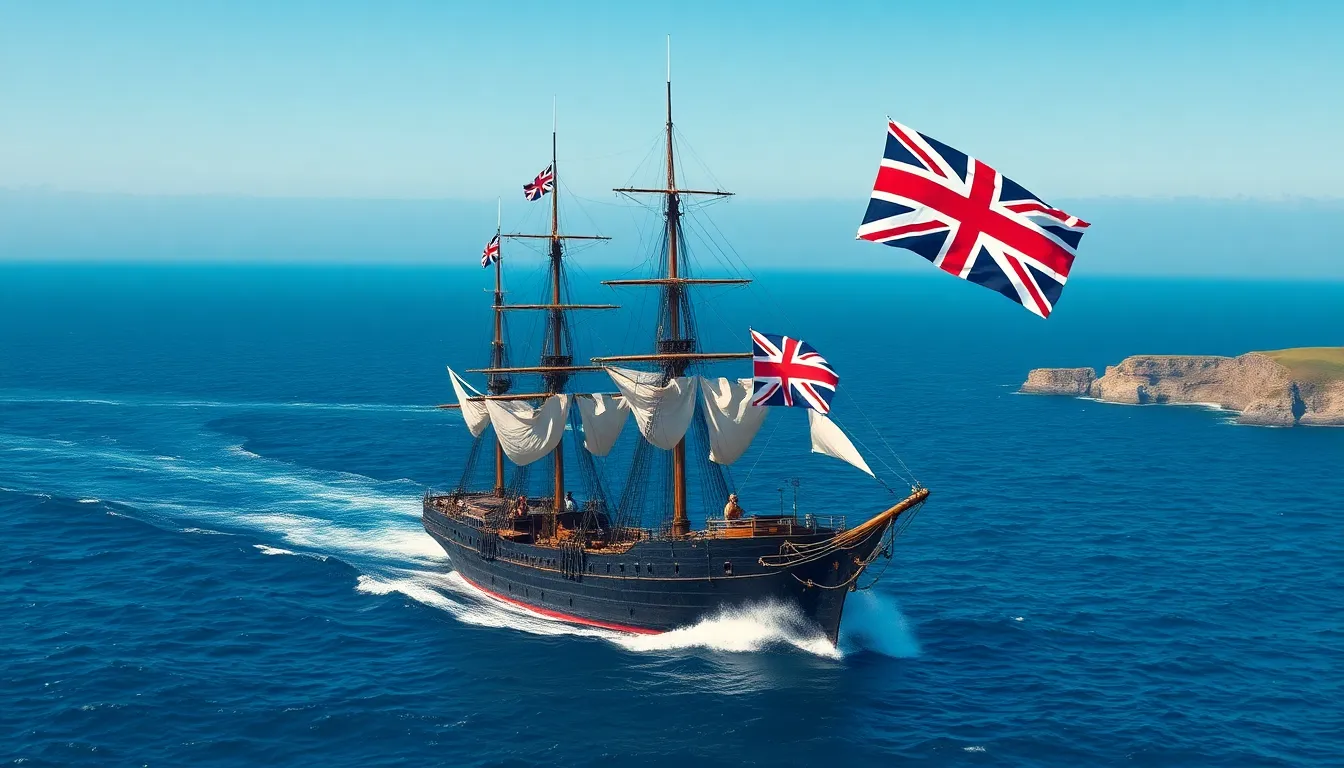Thomas Arne’s “Rule, Britannia!” stands as one of the most iconic pieces of British music, capturing the spirit of a nation during a pivotal era. Composed in the 18th century, this stirring anthem not only reflects the pride and resilience of Britain but also showcases Arne’s remarkable talent as a composer. The lyrics, filled with themes of freedom and maritime strength, resonate deeply with audiences even today.
As a symbol of national identity, “Rule, Britannia!” has transcended its original context, becoming a staple at celebrations and commemorations. The powerful imagery and emotive language in the lyrics evoke a sense of unity and patriotism, making it a timeless classic. Exploring the history and significance of this anthem reveals much about Britain’s cultural heritage and the enduring power of music to inspire and uplift.
Table of Contents
ToggleOverview of Thomas Arne’s Work
Thomas Arne significantly influenced British music during the 18th century. He composed a wide range of works, including operas, songs, and instrumental pieces. Arne’s most notable creation, “Rule, Britannia!”, exemplifies his ability to evoke national pride through music.
Arne’s operatic contributions include “Artaxerxes” and “The Trials of the Heart”, showcasing his talent for dramatic storytelling through melody. His musical style blends elements of Italian opera and English folk traditions, giving his works a unique character that resonates with audiences.
Many of Arne’s songs feature memorable melodies and clever lyrics that emphasize emotional depth. His ability to adapt various musical forms brought fresh perspectives to the genre, setting the stage for future composers. Arne’s legacy remains significant in British cultural history, with his works continuing to be performed and celebrated.
The Significance of “Rule, Britannia!”

“Rule, Britannia!” stands as a powerful anthem, reflecting key themes of British national identity and pride. Its significance extends beyond its musical composition, deeply rooted in historical context and cultural impact.
Historical Context
Composed in 1740 by Thomas Arne, “Rule, Britannia!” emerged during a period of growing maritime strength for Britain. The song debuted in the masque “Alfred,” associated with themes of liberty and national integrity. It coincided with the defeat of the Jacobite uprising, promoting a sense of stability and optimism. The anthem became synonymous with Britain’s naval superiority, especially during the 19th century, when the British Empire expanded significantly. Its adoption at national celebrations reinforced its role in shaping public sentiment around British identity and military prowess.
Cultural Impact
“Rule, Britannia!” maintains a profound cultural resonance, often performed at significant events such as the Last Night of the Proms. Its stirring melody and evocative lyrics foster a sense of unity among audiences, inspiring national pride. The anthem’s imagery of domination and freedom aligns with historical narratives of British exploration and colonialism, cementing its status as a staple of British cultural heritage. In contemporary times, the song evokes discussions around patriotism and identity, signifying its relevance in modern society while prompting reflections on historical legacies.
Analysis of “Rule, Britannia!” Lyrics
The lyrics of “Rule, Britannia!” embody themes of national pride and strength. The imagery throughout the anthem reinforces Britain’s maritime legacy and its identity as a formidable global power.
Themes and Imagery
“Rule, Britannia!” explores several themes, including freedom, patriotism, and resilience. The repeated assertion of Britain’s invincibility on the seas projects a sense of confidence and national unity. Lines highlighting the struggle for liberty evoke the idea of a nation that defends its rights and sovereignty. Vivid imagery of the ocean symbolizes not only the physical dominance of Britain’s navy but also the emotional spirit of resilience that defines British character. The juxtaposition of noble ideals against historical challenges resonates with audiences, enhancing the anthem’s emotional weight.
Musical Composition
The musical composition of “Rule, Britannia!” complements its lyrical themes. Thomas Arne employs a soaring melody that evokes feelings of grandeur and pride. The use of a march-like rhythm mirrors the anthem’s martial themes and suggests a call to arms, enhancing the patriotic sentiment. Distinctive harmonies and a strong, memorable chorus create an uplifting experience, encouraging collective participation during performances. Arne’s innovative blend of musical styles, incorporating elements of folk melodies and operatic grandeur, underlines the anthem’s powerful message, solidifying its place in British culture.
Reception and Legacy
“Rule, Britannia!” received acclaim shortly after its debut in 1740, quickly establishing itself as a symbol of British pride. Its performance during the masque “Alfred” captivated audiences, with the stirring themes resonating powerfully amid Britain’s increasing naval dominance. The anthem’s association with maritime strength made it particularly significant during the 19th century when Britain solidified its status as a global power.
The growing popularity of the anthem led to its frequent inclusion in national celebrations and events, particularly in the late 20th century. Through its powerful imagery, “Rule, Britannia!” fostered a sense of unity among the British people. The Last Night of the Proms exemplifies this cultural tradition, where audiences collectively sing the anthem, reinforcing its standing within the national consciousness.
Scholars recognize “Rule, Britannia!” for its complex legacy, acknowledging its dual nature as both a patriotic song and a reflection of colonial attitudes. Contemporary audiences engage with the anthem, navigating its historical connotations while celebrating national identity. The work’s performance at various cultural events underscores its adaptability and relevance in today’s discussions around nationalism.
Thomas Arne’s broader contributions to British music influenced future composers, establishing patterns of innovation in the realm of operas and anthems. Arne’s blend of Italian operatic styles with English folk traditions laid the groundwork for subsequent musical developments in Britain. His approach not only enriched the cultural landscape of the 18th century but also created a lasting impact evident in the continued popularity of “Rule, Britannia!” and similar works. The anthem’s enduring legacy continues to inspire discussions about British identity, reflecting the complexities of national pride and historical context.
Thomas Arne’s “Rule, Britannia!” remains a powerful emblem of British identity and pride. Its stirring lyrics and captivating melody continue to inspire audiences, reflecting themes of resilience and maritime strength. As a cornerstone of British cultural heritage, the anthem transcends time, resonating deeply during national celebrations and events.
The legacy of Arne’s work not only highlights his innovative contributions to music but also invites contemporary discussions about patriotism and historical context. As “Rule, Britannia!” is performed, it serves as a reminder of Britain’s complex past and the enduring spirit of its people. Through its powerful imagery and communal experience, this anthem solidifies its place in the hearts of many, ensuring its relevance for generations to come.




